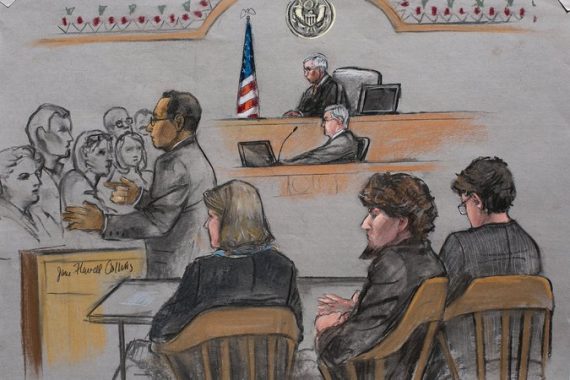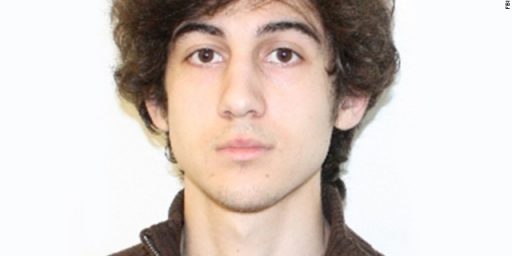Dzhokhar Tsarnaev Apologizes For Boston Marathon Bombing, Is Sentenced To Die Anyway
Dzhokhar Tsarnaev appeared in public for what is likely the last time in his life, apologized for the crimes he committed, and was unsurprisingly sentenced to death by a Federal Judge.
Dzhokhar Tsarnaev spoke in Court today for the first time since he was arrested and entered a not guilty plea, but his victims spoke too, but in the end he was unsurprisingly sentenced to death:
After two years of silence, Boston—and the world—got to hear from Dzhokhar Tsarnaev.
There were no cameras in the courtroom to capture Tsarnaev’s words, but reporters at the scene offered their transcriptions of his statement. He invoked the name of God multiple times as he apologized for the death and mayhem he caused at the 2013 Boston Marathon bombing.
“I would like to now apologize to the victims and to the survivors,” he said. “I want to ask for forgiveness from Allah … I pray to Allah to bestow his mercy upon the deceased.”
Tsarnaev, who in May was convicted on multiple charges related to the bombing, described learning about his victims after he placed the bombs on Boylston Street.
“Immediately after the bombing, which I am guilty of, let there be no doubt about that … I learned about some of the victims … I learned their names, their faces, their ages,” he said.
“More of those victims were given faces. And they had hearts and souls.”
After Tsarnaev finished speaking, Judge George O’Toole formally sentenced him to death.
“No one will remember that your teachers were fond of you … That you were funny, a good athlete,” O’Toole said. “What will be remembered is that you murdered and maimed.”
Tsarnaev stood as his death sentence was announced. O’Toole ordered he be executed at a federal facility in Indiana.
To a large degree, the imposition of the sentence against Tsarnaev was entirely predictable. The jury in his trial had convicted him and sentenced him to death last month, and while Federal law does grant the trial judge some discretion to deviate from that sentence, it is something of a rare occurrence for a District Court Judge to reverse a jury determination that a Defendant should be sentenced to death. In this case, given the facts of the case and the lack of any real mitigating evidence whatsoever, it was even less probable that Judge O’Toole would change the jury’s sentence in any respect, and of course he didn’t. Nonetheless, the sentencing hearing did give Tsarnaev’s victims and their survivors one more opportunity to confront the man who conspired to kill and maim them and tell the Court how his actions have impacted their lives. The law also gives Tsarnaev the right to address the Court before sentencing, but going into the hearing today it was unclear if he would do so given the fact that he did not testify in either the guilty or sentencing phases or the trial, and did not address the jury prior to its imposition of a sentence. Indeed, throughout the trial the media reports made it clear that he was largely unemotional during the presentation of evidence regarding the impact of the bombing at the Boston Marathon’s Finish Line. The only time he was reported to have displayed any emotion at all was during the entire trial was during the testimony of one of his relatives regarding the circumstances he was brought up in. At this point, his apology, such as it is, largely falls on deaf ears and one doubts he’ll be getting much pity from anyone, especially the victims and the people of Boston.
The path from here to Tsarnaev’s likely execution will likely take years for that process to work itself out. Federal law provides for automatic appeals of his death sentence, so there’s really no option for Tsarnaev to wave those appeals even if he wished to do so. To be honest, there are almost no appealable issues in this case from what I’ve gathered of the evidence that was presented. There is no doubt that Tsarnaev is guilty, indeed he admitted it today, so the conviction itself isn’t going to be overturned. The sentencing itself is unlikely to be found to have been in error either, since the mitigation evidence presented by the Defense was sparse at best. If there is a potential issue for appeal here, it is in the Court’s decision to deny the Defense’s motion to change the venue of the trial way at the beginning of this process. While such motions are generally considered to be within the discretion of the trial judge, Tsarnaev’s lawyers are likely to argue to the appellate courts that denying the request in this case was an abuse of discretion due to the tremendous impact that bombing had on Boston. Of potential relevance in this regard is the fact that the trials of Timothy McVeigh and Terry Nichols for their role in the Oklahoma City Bombing were moved out of Oklahoma entirely due to some of the same issues that Tsarnaev’s lawyers raised. The counterargument to the contention that holding the trial in Boston denied Tsarnaev a fair trial due to the impact of the bombing on the local community is, of course, that the fact that the bombing was widely covered by the national media means that it was unlikely that any jury would have been immune to whatever passions the Boston community felt. Additionally, the political makeup of Boston arguably means that it was the most favorable venue for Tsarnaev’s efforts to receive a sentence other than death. Most of all though, the fact that it is unlikely that a trial anywhere else in the United States would have turned out differently argues strongly against the idea that denying the request to change venue was in any way prejudicial.
All that being said, it is likely to be many years before Tsarnaev is executed. Timothy McVeigh was sentenced in July 1997 and executed in June 2001, for example, so it will likely be at least that long before Tsarnaev meets his end. Given the fact that death penalty litigation has changed significantly in the fourteen years since McVeigh’s death, though, it will probably be much longer than four years before the sentence imposed last month is carried out. Until then, Tsarnaev will spend most of his time alone in a SuperMax prison cell, which may be something he considers worse than death.






We all know all the problems with the death penalty so I don’t have to go into that. But the death penalty is necessary in some cases. People like Tsarnaev and Timothy McVeigh really HAVE to die. Its the only appropriate sentence.
@Barfour:
I don’t think there is any underlying reason that they have to die, other than the public (probably) wants it. However, that’s obviously not how our system does or should work.
That said, and while I’m against the death penalty, I don’t think I’m going to shed a tear when he’s given the lethal dose.
And that’s the value of due process and proper courts of law: Tsarnaev’s value as a martyr is now nil.
I love the title of this article. It’s as if he should not be executed because he said “sorry”. Yes, that makes it all better, doesn’t it? Apologies resurrect the dead and stuff, right? I guess liberals just don’t get it until someone they love is executed, and even then, most still don’t get it. There’s something sick and demented in the liberal mind as it eulogizes murderers and cares nothing for the innocent dead except to heap up mountains of them. Mercy run amuck is not mercy.
@InRussetShadows: There’s some famous fiction out there, maybe you’ve read it, a fellow named Jesus was well known for forgiving any number of transgressions in exchange for a sincere apology. But my understanding is that you’ve really gotta mean it – he can tell if you’re faking.
Maybe his apology just wasn’t sincere enough? What would Miss Manners have said about ignoring someone’s heart-felt apology like this?
The apology does not mean much to me; I don’t consider this guy as an example of understanding the value of life and the consequences of actions. However, his execution will not make me feel better or safer. Nor will it make the USA a better society in my opinion.
When Eichman was put on trial, the local newspaper interviewed my parents. My mother had been in Ghetto Łodz. She was opposed to the death penalty on the basis of her belief in the obligation to uphold human dignity even when confronted by the worst of us. I try to live up to the standards she set.
I will be surprised if the sentence is carried out.
@Tyrell:
It won’t be for quite some time. The appeals process will be lengthy. It will, though, be difficult to find any procedural errors in the trial, as far as I can tell. And he admitted his guilt, which will make any vacation of the sentence nearly impossible.
@Slugger: ” However, his execution will not make me feel better or safer. Nor will it make the USA a better society in my opinion.”
I agree.
And then there’s the fact that I worked in a prison for several years, in maximum and close
security facilities, and would rather be dead myself than live in such places for any length of time.
The comment from InRussetShadows has made me reconsider the implication’s of “Poe’s Law” situations, where some falsehood is misattributed to an ideology because the ideology is extreme enough to in itself blur the lines between sensible and absurd. (For example, incorrectly thinking that a conservative might push for the total elimination of Medicare, because it’s not far off from their true beliefs.)
It’s possible that in some cases, the misattribution reflects worse on the person doing the misattributing than it does on the ideology in question, because it means they have such a skewed notion of what that ideology is really about. I’ll keep that in mind the next time I find it plausible that some Republican actually said thus-and-such horrible thing about gay people. (Assuming said Republican isn’t Santorum, in which case all bets are off.)
Anyway, very few liberals oppose the death penalty on the grounds that sometimes convicted people express sorrow. In fact, that’s why I (a death penalty opponent) bristled at this headline, since it coupled two things that I think have little to do with each other. However, I grant that some people do consider contrition an important factor (particularly Christians, as alluded to by Tony W — and both conservatives and liberal ones).
Did anyone actually READ the transcript of his statement? And yes, it was a statement, not an apology.
— 16 invocations of Allah
— 3 invocations of “Prophet Muhammad, peace and blessings be upon him.”
The actual “apology” part of his statement:
HIs “apology” was an attempt to evangelize on behalf of Islam. He worked in his “apologies” around repeated expressions of the glory of Islam, and not once indicated that he regretted his actions.
This is not accidental. The punk didn’t say he regretted it because he doesn’t. And he spent nearly all of his time talking about how he was a faithful Muslim, complete with appropriate citations.
@Jenos Idanian #13:
…what’s your point?
@Neil Hudelson: That calling his statement an “apology” is misleading, at best. He obviously considers his Muslim faith the most important part of his identity, and he has zero regrets for his actions. The conclusion is that he doesn’t consider his actions in any way in conflict with his Islamic beliefs.
And his beliefs are hardly unique.
Hmmm, lengthy wait for the executioner? I wonder why the judge didn’t order it to be carried out either in Texas or Florida. The norm in these states is 7 to 9 years.